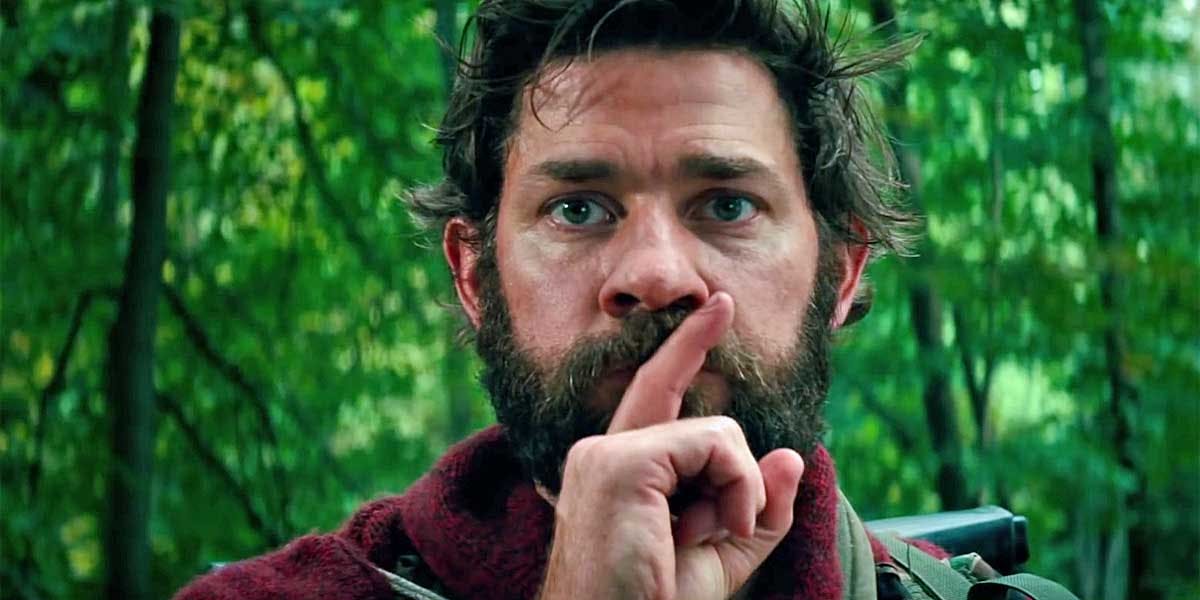Here's one way to get a modern multiplex crowd to shut their traps. A Quiet Place, the directorial debut of the actor John Krasinski, unfolds in a post-apocalyptic America stalked by vicious long-legged creatures - part-Gremlin, part-Louise Bourgeois spider - attracted to any sound, any noise humanity's survivors might let slip. We explore this landscape - barefooted, on tiptoes, with sand set down to muffle our heavier footsteps - alongside Everycouple Lee and Evelyn Abbott (Krasinski and Emily Blunt) and their young family: three kids in one of those lethal prologues the horror genre has traditionally sprung upon us, then two, with a third on the way. (Try stopping that one wailing when it comes out.) It's such a simple idea - kill the sound, because sound kills - that you spend much of the film marvelling that it hasn't been done before; only upon walking back to the carpark do you recall it sort-of has, in 2016's Don't Breathe. Krasinski, however, pushes the hushed hide-and-seek conceit further, beyond closed doors, and makes enforced silence the whole damn world.
The real marvel is that he does this with such elegance; rarely, if ever, does A Quiet Place seem like a gimmick-movie. From the off, we're offered a detailed sense of how life has to be lived in this environment: tentatively, in the middle of some Midwestern nowhere, far from even the possibility of noise, with soft cabbage leaves substituting for dinner plates, and a rudimentary sign language as the only permissible means of communication. There are, obviously, limitations to this way of living. Clock the look in Lee's eyes after his offspring topple a kerosene lamp while playing Monopoly: boy, does pa want to bawl the pair of them out, but he knows the rules of the game won't allow for it. (His tongue-holding here finds a poignant echo in a later scene where it becomes apparent he wants to tell these kids he loves them.) There's a particular cleverness to the way prologue connects to action proper: here is a family who not only cannot speak, but scarcely feel inclined to speak, to articulate their losses. Instead, they must internalise their traumas - put up and shut up, as the viewer must too.
It is, then, the strongest imaginable riposte to that shallow quiet-quiet-loud strain of horror movies: there are at least another couple of quiets in there, for starters, and it may be that Krasinski's loud is really just normal as heard in a different context. (Take the brook father and son visit around the halfway mark, which doesn't babble so much as drown everybody out.) The Krasinski character has had to become something of a handyman to survive, and there's something of the technician in the way his direction continually tests everybody's levels. The family's deaf daughter Regan (Millicent Simmonds) interprets this environment in a slightly different manner to everyone else, comparatively serene when inside her own head, but also prone not to hear encroaching risk. Of that, there is plenty, for the film is entirely ruthless about paying off everything Krasinski sets up. The growing curve of the Blunt belly should concern us, as should the exposed nail sticking out of a cellar staircase, and the daughter's scowly-faced independence. Screams, of one kind or another, never seem far away.
We might concede that Don't Breathe, from the Spanish outlier behind the Evil Dead remake, had a harder, nastier edge than this, which is still somehow recognisably the work of Jim from The Office. The earlier film was a brilliantly cynical construction; A Quiet Place builds towards an attempt to put a family back together in the dark, without a single cry of Marco, let alone Polo. Yet Krasinski orchestrates this movement like a master-in-waiting, recruiting editor Christopher Tellefsen (Moneyball, Joy) to ensure there's not an inch of flab on the entire movie, the better to hustle us, without lasting objection, past the vaguely contrived means by which man begins to fight back against monster, and Blunt's remarkably uncomplicated recovery from the stresses of unassisted labour. It is, at the last, a pared-to-the-bone parable of parenthood, and the sacrifices we make to give the next generation a shot at a better world: a film at once radical and conservative, terrifying and deeply moving, and proof - after last year's Get Out and It Comes at Night - that horror is just about the one thing American cinema has going for it right now. Just don't shout too loudly about it, that's all.
A Quiet Place is now showing in cinemas nationwide.

No comments:
Post a Comment